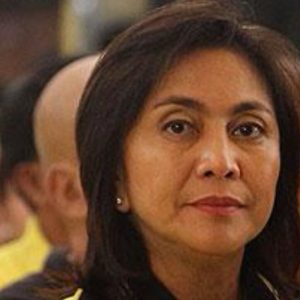Who would have thought that the late former ambassador Roy Señeres, who withdrew from the presidential race shortly before his death last February would affect the Presidential Elections conducted on the 9th of May? It seems dead people have a way of “influencing” Philippine politics. We all know that incumbent President Benigno Simeon Aquino only got elected through sympathy votes after his beloved mother and so-called EDSA people power icon Cory died a few months before the 2010 Presidential Elections. Likewise, Vice Presidential candidate Leni “Daang Matuwid” Robredo also benefited from her late husband’s passing who died in a helicopter crash while still the Department of Interior and Local Government (DILG) Secretary. Shortly after, she won as congresswoman in the 2013 elections.

Leni Robredo: Will she allow hers and her late husband’s good names to be dragged down by Liberal Party cheats?
So how did Señeres affect the recently held Presidential Elections? Well, apparently the “ñ” in his name along with several other candidates’ names came out as “?”. At least this was the Venezuelan Smartmatic technician’s excuse when asked why he inserted a new program at 7.30pm of Election Day while the system was in the middle of canvassing the votes. The technician added later on that it was his boss Smartmatic Project Director Marlon Garcia who instructed him to do so. They are calling this mere “cosmetic change” and did not affect the election results.
Yeah, right. But the Commission on Elections (COMELEC) supposedly conducted a dry run prior to the elections, so the question is, why didn’t anyone from both Smartmatic and the COMELEC notice that the “ñ” came out as “?” during the dry-run? The more important question is, why didn’t the Smartmatic technician inform anyone from either the Parish Pastoral Council for Responsible Voting Center (PPCRV) or COMELEC of what he was about to do before doing it?
Based on the reported accounts of the IT expert from the PPCRV who remains anonymous, when they confronted the Venezuelan technician, his initial response was he just needed to introduce a “new script” without mentioning the reason.
The IT expert said there was no Comelec official present when the tampering of the system took place.When confronted, the source said the Venezuelan admitted that the order to introduce a new script came from Marlon Garcia, project director of Smartmatic.The source said the “confrontation” had been recorded on video and audio.“The Smartmatic IT expert’s job was only to ‘receive, decrypt and distribute’ the files. Since we are also IT experts and we have been doing this since the preparation for seven months already, we knew what the Venezuelan did was something irregular. He introduced a new script, a new computer program and commands that could alter everything and supersede the existing program,” he said.He explained that the breach was confirmed when the “hash code” that was inside the transparency server was different from the hash code brought in by the Smartmatic.“The hash code inside the transparency server should be the same as the one to be inserted. We saw they’re different so we started to be suspicious and confronted the guy,” the source said.

Bongbong Marcos and son Sandro bravely face massively-orchestrated fraud and media demonisation by the Liberal Party.
It’s outrageous that both the Smarmatic technician and Project Director Garcia haven’t been arrested yet for violating Republic Act 8436 or the Philippine Automated Election Laws that prohibits any tampering without authorisation from COMELEC officials especially in the middle of transmitting election results. The authorities should have arrested them right there and then and interrogated them immediately. They should not be allowed to leave the country before allegations of election fraud are resolved.
The problem is the people in authority are showing their bias. The speed with which COMELEC Chairman Andres Bautista denied there was cheating involved was quite suspect. He said this even before thorough investigations were conducted. Likewise, PPCRV’s Henrietta de Villa also denied there was a confrontation involving her people and the Smartmatic Technician even when the incident was recorded. Some say that they are making light of the breach of security as usual. It is worth noting that Bautista is a close ally of both Aquino and former cabinet member and Presidential candidate Mar Roxas who lost the election to Davao City Mayor Rodrigo Duterte. Meanwhile, speculation is rife that De Villa is a staunch anti-Marcos advocate.
Some IT experts are asking: What was the point of the code certification when the code can be replaced anytime even in the middle of transmission of data? It just doesn’t make any sense.
It turns out that Smartmatic also did a similar stunt during the 2013 midterm elections. In fact, a group had filed a lawsuit against Smarmatic officials for electoral sabotage when they changed the source code just hours before the voting closed on 13th of May 2013:
An election case was filed on Thursday before the Commission on Elections against officials of Smartmatic–Total Information Management (TIM) Corp. for allegedly altering the source code of the Precinct Count Optical Scan (PCOS) machines in the May 13, 2013 midterm polls.In their Joint Affidavit-Complaint, the group headed by former poll body commissioner Gus Lagman accused Smartmatic officials Cesar Flores, President for Asia-Pacific; Albert Castro Rico and Marlon Garcia of violating Republic Act 9369, or the Poll Automation Law when it changed the source code just hours after voting closed last May 13, 2013.“Smartmatic officials/personnel inexplicably changed the scripts of the un-reviewed source code at or about the time of the consolidation/canvassing during the said elections,” they said in their seven-page complaint.They added, “This action on the part of Smartmatic as well as the Election Management System constitutes the crime of electoral sabotage.”
In unrelated news, in 2006 Smartmatic was the subject of a U.S. Federal government investigation after the company’s takeover of a leading American manufacturer of electronic voting machines Sequoia Voting Systems of Oakland, California. It was alleged that leftist Venezuelan President Hugo Chávez is part owner of Smartmatic and could influence election results in the U.S. The allegation was strongly denied by Chavez and said that his government only use Smartmatic for Venezuela’s electoral process. Meanwhile back in 2004, the Venezuelan government’s financial agency reportedly invested money “into a smaller technology company, owned by some of the same people as Smartmatic, that joined with Smartmatic as a minor partner in the bid”.
In return, the government agency was given a 28 percent stake in the smaller company and a seat on its board, which was occupied by a senior government official who had previously advised Mr. Chávez on elections technology. But Venezuelan officials later insisted that the money was merely a small-business loan and that it was repaid before the referendum.
Smartmatic as a company has come a long way from being a once fledgling technology start-up to now selling its products to developing countries like the Philippines where safeguards against fraud are weak or quite often ignored. This is precisely what happened in the recently-held Presidential Elections.

Embattled president of Smartmatic Asia, Cesar Flores
I would recommend a Senate inquiry into the electoral fraud allegations but considering a lot of senators are members of the Liberal Party, the investigation will amount to nothing but opportunity for them to grandstand.
Indeed, perpetrators of election fraud using electronic machines expect the public not to notice anomalies especially when tech jargon is involved to explain the phenomenon. They are also hoping that the public’s short attention span will work on their behalf. And this is the reason why allegations of cheating in the 2010 and 2013 elections did not progress into criminal prosecution. Unfortunately, it is also the reason why election fraud will continue in the years to come.
If Filipinos want the tradition of cheating during election to stop, they should stop asking Senator Bongbong Marcos to concede even before a formal investigation takes place. If Robredo’s lead was in the millions and if there weren’t any dubious activities during the election, I would agree with them. But Robredo’s lead is not that big and the circumstances when her numbers started going up – after the Venezuelan Smartmatic personnel changed the script – has cast a doubt on the whole election process. The integrity of the result has been compromised.
If I were in Robredo’s shoes, I would join the calls for an investigation and possible recount just to remove doubts about the election result. Based on unofficial election results, Robredo should recognise that the number of people who supported her is almost the same as the people who supported Marcos. That only means there are millions of people who believe in Marcos Jr despite the negative propaganda continually hurled against him. Robredo should be careful not to insult their intelligence. Since the election anomaly has happened, there are more people who think she has sold her soul to the Liberal Party. She should do something to change that perception.
Cheating to win the election is so Third World. Smartmatic seems to be leading the way for despots to rule in such countries. Hopefully, Filipinos will put an end to this. Filipinos cannot consider themselves to be living in a truly democratic country if their politicians can cheat election results and get away with it. It means politicians who have the means are choosing for them. If this trend continues, Filipinos might as well call the Philippine election process dead.
No comments:
Post a Comment